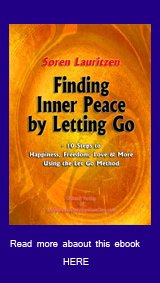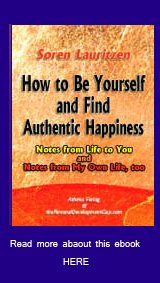How You Can Empower Yourself Using the Seven Human Needs
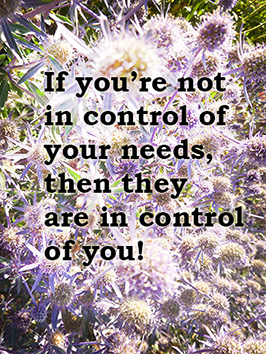
• Understanding & learning to deal with needs is empowering!
• Maslow's hierarchy of needs listed 5 (later 8) basic human needs
• The Personal Development Guy suggests seven ...
• ... AND, more importantly, tells you how to set yourself free
Empower Yourself by Understanding the Hierarchy of Needs
Becoming aware of your needs and learning to deal with them is one of the most empowering things you can do. Why? Because the needs you perceive yourself to have can - and do - control your feelings, thoughts, beliefs and actions. This is true whether you are aware of it or not.
You, however, are in control of your needs. Precious few people realize this. If you want a better life and personal empowerment I strongly urge you to read on so that you become one of those who do.
You see, if you are NOT aware of your perceived needs you effectively become a slave of them. An unwitting slave, but a slave nonetheless. Your needs will control your feelings, thoughts, beliefs and actions and you will have no choice about this. By gaining awareness of your needs and what to do with them you empower yourself and set yourself free.
In short, we FEEL, THINK, BELIEVE and ACT as if our needs are absolute (real and unavoidable) when in fact they are relative (not all that real and a matter of choice). You don't NEED to have your needs fulfilled; you can choose to let them go!
This is a bold statement indeed, and I'll get back to it in the latter part of this page. By the way, this page is one of the more basic and powerful of the self improvement articles on this website - an important part of my (the Personal Development Guy's) empowerment theory.
What Are Your Needs?
You may feel a need for just about anything: From the most basic need to survive to the need for sex, to the need for control or freedom, to the need for personal development, to the need for another cigarette, drink or piece of chocolate. Huge and general or small and specific, our perceived needs are as countless as the waves of the sea.You may feel a need to keep a certain job - or to leave it. You may feel a need to discipline your child - or to show your child unconditional love no matter what. You may feel a need to sleep - or to stay awake. You may feel a need for a cup of coffee - or to never touch coffee again.
Your need could be anything, anything at all - and odds are you REALLY want each and every need you perceive to be fulfilled.
The Seven Human Needs = The Basic Human Motivators!
To have your big and basic needs fulfilled you will do almost anything, and you won't even think twice about it. Needs are one of the most powerful motivators there are - perhaps THE most powerful motivator.That is one of the reasons why the understanding and learning to deal with the basic human needs is so incredibly important: Needs are behind many or even most things we do. Even when we neglect to do something it usually has to do with some need we (consciously or unconsciously) perceive that we have.
If you are or have been in sales, odds are you already know this. If you can convince someone that they NEED your product it is as good as sold. There is even a sales model called 'needs based selling'. The needs based selling model can be applied to any and all kinds of sale - simply because the basic human needs are universal and most of us tend to think we MUST have our needs fulfilled.
As you can no doubt see by now, those 'in the know' about needs, can manipulate those who are not 'in the know' - and if you take the time and effort to educate yourself in the area of the basic human needs, you are doing yourself a huge favor by empowering yourself immensely. Needs are worth understanding - and it is just as worth it if you learn how to deal with needs.
A Science of Human Needs?
But if needs are really that important, isn't there some science of needs? Well, yes, or at least there are some very intelligent scientists and authors who have proposed different ways to look at and categorize human needs.In the personal development literature (self help books and authors [LINK]) these are several theories about needs:
From Abraham Maslows hierarchy of needs (early theory: 5 basic needs, later theory, in conjunction with others: 8 basic human needs), to the complex matrix of 9 needs and 4 'satisfiers' proposed by Chilean economist and philosopher Manfred Max-Neef together with Antonio Elizalde and Martin Hopenhayn, to the seven human needs which are polarized (making it 14 total, in a way) that I myself (the Personal Development Guy) propose and use.
As they are all just theories (attempts to simplify and describe reality) none of them is better, more 'right' or more correct than any other. I am going to dedicate several self improvement articles to the subject of needs, but in this one I will give you a brief overview of my own theory and tell you how to identify and deal constructively with your needs so that you may set yourself free.
Dealing with a million or more needs is impractical, so theorists attempt to 'bunch' or 'chunk' them and figure out what the most basic ones are. Here's how I have bunched them:
The
Personal Development Guy's Theory of
Seven Polarized Basic Human
Needs
1. Physical survival & reproduction/sex - vs. - death instinct & abstinence
2. Safety, comfort & predictability - vs. - unpredictability & challenge
3. Control, responsibility & freedom - vs. - no control, no responsibility
4. Recognition & a feeling of belonging - vs. - disapproval & individuality
5. Giving and contributing - vs. - receiving / getting
6. Development & full use of abilities - vs. - status quo & self limitation
7. Unity, wholeness & being your soul identity - vs. - separation & ego
Explanations for the Seven Polarized Basic Human Needs
The most common version of a need is the one on the left side of the dash in the above overview. This means that e.g. feeling a need for survival and/or reproduction is more common than feeling a need for death (having a death wish) and/or sexual abstinence. Both are quite possible, though.So when you look at the overview of the seven human needs above you will find the most common version on the left side of the dash and the less common version - the opposite polarity of the same need - on the right side of the dash.
All of these seven needs in both of the polarized versions are extremely powerful human motivators. Most of what we do in life is motivated by one or more of these seven human needs.
Now, there's nothing wrong with that, except if you let it happen unconsciously you forfeit the possibility of making a conscious choice and directing your life and experience consciously.
Further, if you DO make yourself aware of these powerful basic needs and you get so far as to realize that they are NOT unavoidable forces that must be obeyed, but rather relative needs that you can bend, adapt, substitute and even let go of completely (very empowering!) then you free yourself to make any choice in life you desire.
Okay, so that's a brief overview of the Personal Development Guy's model of the seven human needs. How does this theory compare to the most famous model of the basic human needs?
Maslow's Theory about the Basic Human Needs
Probably the most famous and most commonly accepted model of our needs is Abraham Maslows hierarchy of needs. This theory of 5 basic human needs was proposed as early as 1943 (in a paper he called 'A Theory of Human Motivation'), further developed in 1954 (in the book 'Motivation and Personality') and since fully developed to a theory of 8 basic human needs, partially with the cooperation of other scientists.Here are the 8 basic human needs from the Maslow pyramid of needs, with the most basic ones first, and the original 5 made bold:
1. Physiological Needs
2. Needs for Safety and Security
3. Needs for Love and Belonging
4. Esteem and Recognition Needs
5. Cognitive Needs
6. Aesthetic Needs
7. Need for Self-actualization
8. Need for Self-transcendence
Maslow's Hierachy of Needs:
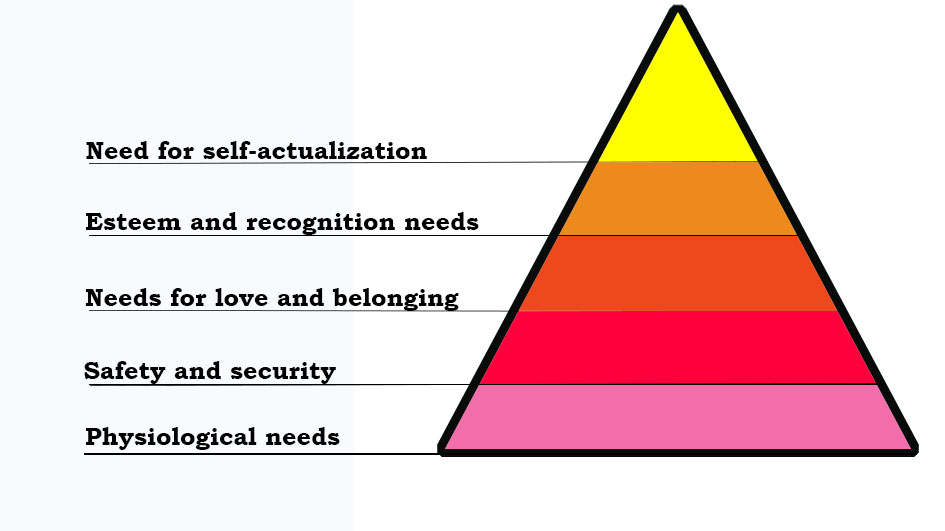
Discussing Maslows Hierarchy of Needs vs. the Personal Development Guy's Seven Human Neeeds
Abraham Maslow's hierarchy of needs is, as the name suggests, a hierarchy - a way of organizing the basic human needs with the most basic and important ones first (survival and comfort needs), the somewhat less basic and important ones (social needs) later, and the even more optional ones (self realization needs) in the end - or at the top of the 'pyramid', as many graphical depictions of Maslows hierarchy of needs indicate.Hierarchy of Needs or No Hierarchy of Needs?
Given that the seven human needs that I use are fairly close to the (5 or later: 8) basic human needs that Abraham Maslow proposed (except that the seven human needs I operate with are polarized, making for a more flexible and accurate system) one would think that I would have the same hierarchical organization of the basic human needs. Well, I don't, not really.
I do think that there is a sort of loose hierarchy of needs in that the first two or three basic human needs (survival/sex + safety/comfort + perhaps also control/freedom) are more important and basic to us than the rest. The other four or five needs, however, often take varying precedence over each other, depending on the individual and his or her situation.
For one thing every human individual is unique and each person may emphasize different needs, and for another there may be cultural differences at play, too.
For instance there may be differences between people raised in individualistic societies (e.g. USA, Europe and other Western cultures - such as the one where I myself grew up) and those raised in more collectivist societies (where family or group is perceived as more important than the individual).
The latter was pointed out by Dutch anthropologist and social psychologist Geert Hofstede (Gerard Hendrik Hofstede) who theorizes that in collectivist societies the needs for acceptance and togetherness (community) may outweigh the needs for freedom and individuality.
Hierarchy of Needs: One of the Needs Is Usually Primary
Also, any action a person takes can easily be motivated by more than one of the basic seven human needs.
In my work as a business coach and a personal development coach what I almost always see, however, is that in any given situation one of the seven basic needs is perceived to be the main motivator, a.k.a. the primary need. Other basic human needs may be involved, but will be perceived as secondary.
In short, in any given situation you can almost always pinpoint one single basic need that is more important to you than the others.
All this makes for a different kind of hierarchy of needs - a more flexible one than the one proposed in Maslow's hierarchy of needs.
Hierarchy of Needs - or not:
Examples of the Seven Polarized Basic Human Needs in Practice
Since it has been a while since I mentioned the backbone of my own (the Personal Development Guy's) theory of seven polarized basic human needs, here they are again:1. Physical survival & reproduction/sex - vs. - death instinct & abstinence
2. Safety, comfort & predictability - vs. - unpredictability & challenge
3. Control, responsibility & freedom - vs. - no control, no responsibility
4. Recognition & a feeling of belonging - vs. - disapproval & individuality
5. Giving and contributing - vs. - receiving / getting
6. Development & full use of abilities - vs. - status quo & self limitation
7. Unity, wholeness & being your soul identity - vs. - separation & ego
A lot of 'smaller' less basic human needs fall into each of the above seven categories (in fact EVERY human need imaginable falls into one of the seven categories. Here are some real life examples:
- If you work outside of your home you might feel a need to always take the same route and type of transportation to your place of work, even though several alternatives exist. Beneath this behavior lies the basic need for comfort, safety and predictability (in the loose hierarchy of needs, above, that's basic need no. 2, above).
- Next Sunday you may feel a need to do something completely different and go ice skating or parachuting or skinny dipping in the moonlight. This is likely caused by the basic human need for unpredictability, which, is in the loose hierarchy of needs above, is basic need no. 2, but on the right side of the dash.
- You may feel a need to switch to another job because your boss keeps failing to recognize your achievements and your colleagues aren't really all that good as colleagues go. Well, you can attribute that feeling of need to basic need no. 4 in the loose hierarchy of needs above, the need for recognition and a feeling of belonging.
- If you have a child, and this child has been begging for your attention for a while without getting it, the child may feel a need to do something that you don't like or don't allow (being unruly). This is the basic need for disapproval at play (in the loose hierarchy of needs above, that's basic need no. 4, but on the right side of the dash).
- You may feel a need to work for your charities and non-profit organizations. This is likely because you feel a need to be giving (basic need no. 5 in the loose hierarchy of needs, above).
- You may feel a unconscious need to be nagging your lover or spouse. This is likely to be caused by the basic human need for receiving (i.e. you want love, attention, etc.) - also need no. 5 in the loose hierarchy of needs above, but on the right side of the dash.
And the final example:
- You are reading this page on personaldevelopmentguy.com and odds are that you have bought self improvement books or self help ebooks (such as my own Finding Inner Peace by Letting Go).
Well, this is likely to be because you feel a need to learn more about yourself, other people and life so that you may experience personal growth, self improvement and a better quality of life.
This would likely be caused by either the more basic need of development and making full use of your abilities (basic need no. 6, above) or the more basic need for wholeness and unity (basic need no. 7 in the loose hierarchy of needs, above).
You may be motivated by just one of those needs, or both.
How Understanding the Basic Human Needs Empowers You
Why go to the trouble of determining which of the seven basic human needs is at play? Three main reasons:1) Since our needs are our basic motivators, odds are that anything you feel, think, believe and do will be colored by or perhaps even dictated by your needs.
In other words:
If you're not in control of your needs, then they are in control of you!
2) You need to realize the basic need driving you because your unconscious behavior - caused by the need you (unconsciously) perceive - may be quite counterproductive. In fact it often is. Using two of the examples above being unruly is not likely to get the child the loving attention he or she craves, and nagging your spouse or lover is not likely to get you the love and attention that you crave.
In other words:
If you can't recognize (and communicate) your own true need, you may have a hard time getting it fulfilled.
3) You need to realize the basic need driving you because only when you do can you adjust your feelings, thoughts, beliefs and actions so that you can either ...
a) get what you REALLY want
or
b) let your perceived need go.
In other words:
Realizing your real need is the first step in dealing effectively with it.
The Hardest - and Most Important Thing to Understand about ALL Your Human Needs
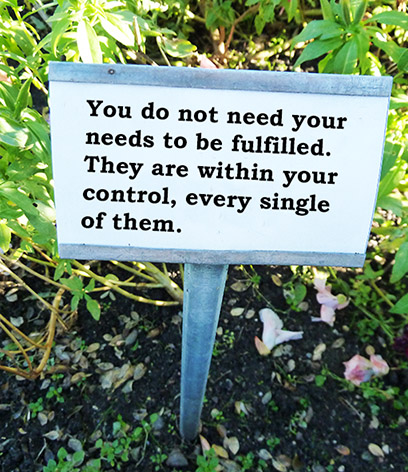
So, now you've heard about the hierarchy of needs (be it loose like I propose or stable like Maslow proposes) and you learnt why needs are so powerful and you've seen why you can empower yourself by learning to recognize and deal with your basic seven human needs. Now we get to this:
Understanding the most important thing there is to understand about your needs. This thing is also the very hardest thing to understand. I have mentioned it in the beginning of this self improvement article, but I haven't gone into it. So, without further ado, here it is again, in an expanded version:
You tend to THINK and FEEL and BELIVE and ACT as if your needs are absolute (unavoidable and must be fulfilled), but in fact they are relative (flexible and subject to your will).
This fact is true of all your needs, and it is at the core of your personal empowerment.
You DO NOT NEED your needs to be fulfilled! They are within your control, every single one of them.
Finally, there is a huge difference between your BELIEF about your need and the ACTUAL need. Your belief does NOT equal your actual need! On the contrary, compared to the actual need your belief about your need will often be inflated and distorted.
Letting go of your belief about one of your needs is easier than letting go of the need itself.
Realizing all this and acting accordingly empowers you and sets you free.
With the small and unimportant needs you can probably accept that they don't need to be fulfilled. You don't ACTUALLY need that cup of coffee or piece of candy right now. Nor do you need to take the same form of transportation going the same way to work every day. And so on.
With the bigger and more important needs there's a bigger challenge accepting the above (bolded) statements. It is harder to believe that you do not actually need that boring job. And even harder to believe that you don't need to be in control of a lot of things. And even harder yet to accept that you don't actually need sex (or sexual abstinence).
And hardest of all, of course, will be accepting that you do not actually need physical survival.
On Physical Survival and the Ego vs. Soul
We FEEL a huge need for physical survival, but we don't actually have to believe in that feeling. Your body, if left to its own devices, would definitely disagree - it is hardwired for survival. Nevertheless we can let our physical body die if we so choose, and, more importantly we can let go of the conviction that we must do anything to survive (this is important and we will get back to it).There are countless instances every year when someone risks and maybe even loses their physical life to perform some compassionate or heroic deed. Why would people do that?
You would need to ask each person (assuming they survived) but at the core of the seemingly strange behavior may be the realization that even though our body dies (which it tends to do eventually in any case) our most basic identity lives on.
My Own Explorations and Experiences in Consciousness
I am not going to bore you with my own explorations in consciousness at this point; suffice it to say that they have revealed to me that yes, we humans do indeed have a bigger and more basic identity than the one we tend to identify with in our everyday lives (which is our ego), and yes, that bigger, more basic identity is NOT in any way affected by the state of the physical body.If you are not averse to using this kind of terminology you might say that we do indeed have a soul, and seen in a human perspective that soul is indeed immortal.
I usually talk about our big core identity (the soul) versus our small, relative identity (the ego).
After the transformational experiences that some of my many explorations in consciousness lead to, I, personally, identify much more with my soul (and that which is even bigger) than with my ego. I do recommend doing this, as it puts an end to most kinds of fear, empowers you immensely and allows you to live a life of freedom no matter what your circumstances - not to mention the fact that it feels so much better than identifying with the ego.
On Physical Survival and the Physical Body
As for the body, I often call it my space suit, because that is how I perceive it - a suit I have temporarily donned to explore the wonders of physical existence in this particular time and age on planet Earth. (Of course it is not so much a question of 'donning' the body - it is more a question of fusing with it, or even more precisely: becoming one with it).An interesting sidebar is what I sometimes experienced during the period when I worked as an apprentice 'divemaster' in Cyprus, Greece:
Sometimes tourists trying out underwater diving (with scuba gear and an instructor) for the first time would panic under water. Spotting and taking care of divers in a first time tourist group who were about to panic (or who actually panicked) was one of my responsibilities.
When someone panics underwater it is an extremely dangerous situation, both for the person panicking and for anyone trying to help that person (that would be me).
Here's the thing: A panicking person has close to zero awareness, but is reacting solely from a bodily point of view. What does this entail? It may entail getting rid of the air supply (yes, people do that!), getting rid of the diving mask (yep, people do that, too), thrashing wildly about with arms and legs, grabbing anyone nearby in a death strangle, etc. etc.
Under water this behavior is likely to get people killed.
What is interesting about this is the fact that virtually no higher awareness is present, and the body reacts instinctively. Instinct tells the body that being under the water is bad, having something in your mouth (the breathing apparatus) is bad and having something in front of your eyes (the mask) is bad. Hence, the dangerous behavior.
At the start of this paragraph ('On Physical Survival ...') I mentioned the importance of letting go of the conviction that we must survive at any cost. There is a big difference between letting go of a need and letting go of the actual achievement of whatever the need is about ...
The Difference between a Basic Human Need and a Belief in a Basic Human Need
We all tend to BELIEVE whatever our feelings, thoughts and needs tell us. We even tend to act upon it. But we don't have to. We don't have to do believe anything and we don't have to do anything, either.
In fact, most people have taught themselves that they don't need to believe everything their feelings and thoughts tell them (sadly, it's not really like we learn this in school, is it?).
If we had not taught ourselves this we would do all sorts of terrible things every time we had a negative thought or a murderous feeling. But we don't, because we know that what the thoughts and feelings say - or yell at us - is not real, is not true.
They're just thoughts and feelings, after all. They come and they go.
When it comes to our needs it is harder. Most people have never even considered the fact that needs aren't that far removed from thoughts and feelings - and do not have to be blindly obeyed.
Suggestion: Stop Behaving like an Automaton just because You Have Some Human Needs
When I tell someone they don't NEED to cling to their need (whatever it is) but can in fact let the need go just by making a decision to do so, they often have trouble with it because they somehow think that if they don't BELIEVE in a need they will not be able to (or: inclined to) fulfill it.This is all a load of crap, of course. There is absolutely no difference between believing in an thought, believing in a feeling and believing in a need. They are all totally optional.
I sometimes joke that just because you don't go around believing in the mailman doesn't mean that he or she will stop delivering your letters.
Or, to use the most powerful of the basic human needs in the hierarchy of needs as an example: Just because you stop believing that it is imperative that you survive doesn't mean that you will die - or stop trying to avoid death. Attempting to avoid death is the most natural thing in the world. You don't have to believe that you MUST survive to do it.
Furthermore, if you believe that you MUST survive, you risk living in constant fear. Not a nice way to live.
Who Wants to Be an Automaton, anyway?
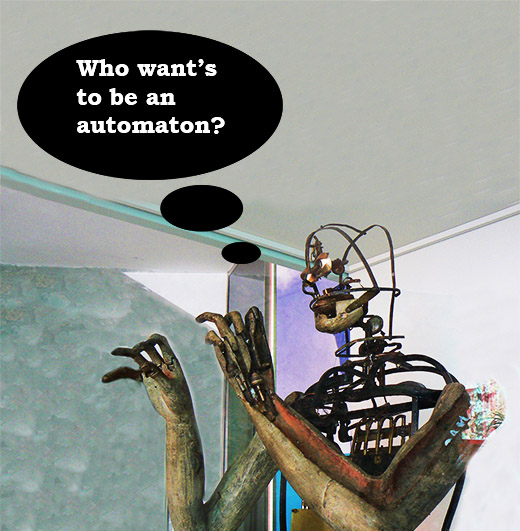
Do you get what I am driving at here? The feeling may be real, but your interpretation of it may not be, nor do you need to act upon it. The thought may exist in your head, but you don't have to believe it, nor do you have to act upon it. You may experience a need, but you don't have to believe in it, nor do you have to act upon it.
In other words: You can let the belief in any feeling, thought or need go, and be none the worse for wear. In fact, odds are you will be relieved and liberated, simply because instead of behaving like an automaton (I MUST HAVE THIS NEED FULFILLED!) you now have a choice.
Who wants to be an automaton, anyway?
Letting go of your belief in the need means letting go of your attachment to the need. Without attachment and the mechanical behavior that follows from that attachment you are free to choose, you are free to accept things the way they are and make the best of every situation. You are free to live.
Briefly: How to Let Go of a Need
There are four steps in this process:1) Make yourself aware that you are experiencing the need (whatever it may be).
2) Examine the need and determine which of the seven human needs from the loose hierarchy of needs your current need is based upon.
3) Make a choice between either fulfilling the BASIC need (the actual, underlying need) you have discovered OR letting go of the need so you can fulfill it or not as you please.
4) Either do what it takes to fulfill the basic need or do what it takes to let it go.
All that is needed in step one is awareness. You notice that you have a need - and what it SEEMS to be. This is the original need, and unless is IS one of the seven basic human needs from the loose hierarchy of needs then it is not the REAL need, but a reflection of it. Example: Your perceived need for some sort of sugar containing candy may simply be a basic need for sleep or rest (it often is), or it may be a need for (self) love.
In step two you simply ask yourself: This need that I have - which one of the seven basic human needs from the loose hierarchy of needs is it based upon? Go through them one by one to see if there is a match. In almost every case this is enough to produce an answer. The basic human need you discover is your REAL need.
In step three you either decide to fulfill the real need or you decide to let go of the need (let go of the belief in the need). This is just a decision, nothing more. Either choice is fine and empowering, but the choice to let go of the need is the most empowering one.
In step four you take action:
- If you decided to fulfill the real need in step three, then you will usually find that fulfilling the real (basic) need is both easier and more satisfying than fulfilling the original (derivative, reflected) need.
- If you decide to let go of the need you either just make the conscious decision to relax and not be ruled by this need, or (probably better:) you use a self improvement technique such as Byron Katie's 'The Work', Brandon Bay's 'The Journey' or my own 'the Let Go Method'.
The latter one is my favorite, of course, and in all honesty I think it is the better choice in this particular case as it is custom made to help you let go of thoughts, feelings, habits, beliefs and needs.
Read more by clicking on the above link for the Let Go Method or read about the general practice of letting go. If you are looking for an ebook that gives you an introduction to the Let Go Method that would be Finding Inner Peace by Letting Go.
Hierarchy of Needs: The Conclusion
A lot of good can come from you teaching yourself to recognize, evaluate and deal with your needs. Not only because fulfilling a basic need is a much more flexible and long-term solution than endlessly fulfilling every little need that seems to arise all the time, but also because you DO have the option of letting go of your attachment to your perceived needs, even the basic seven human needs (especially those!)When you let go of your attachment to your needs you empower yourself tremendously because you are now in control of your needs instead of your needs controlling you.
I HIGHLY recommend that you familiarize yourself with everything mentioned on this page and try out the 'the Let Go Method' for one of your needs - just to know what it feels like and what it does for you and your life.
No matter what you choose I wish you the very best of luck in your personal development endeavors!
The Personal Development Guy's Self Improvement Ezine (FREE)
Would you like to keep in touch - and get high-level tips and special bonuses? Then please sign up for my self improvement newsletter The Personal Development Guy's Self Improvement Ezine. It is totally FREE.
I LOVE Your Support
If you've found the free personal development content on this website useful, please click the Donate button. Your donation will help me to keep producing free, high-level self improvement information. I am VERY GRATEFUL for your support!
Inspirational Quotes, Poems and Funny Short Stuff
If you want, you can also get your personal development, spirituality and general wisdom in an ultra light version - or even add your own wisdom to the site. Just go to the other sister of this website at:
- World's Best and YOUR Best Quotes, Poems and Short Funny Stuff
Quotescoop.com is also known as:
(http://www.inspirational-quotes-short-funny-stuff.com).
High-Level Positive Parenting Advice and Deep Insights
Positive Parenting Ally is the parenting equivalent of the Personal Development Guy. This is where you go if you want really deepen your understanding of parenting, empower your kids and make everyday life more easy and joyful.
Positive-Parenting-Ally.com
- Parenting advice for the conscious, open-minded parent!
Back to the top of this page about The Hierarchy of Needs: How You Can Empower Yourself Using the Seven Human Needs
Where Would You Like to Go Next?
Jump to the page Empowerment Theory to read more about empowerment in general and how the loose hierarchy of needs fits into the bigger picture, or jump to the other 'mother page' of this one - Self Improvement Articles - to read more about personal development and self improvement in general.List of all the subpages to the main page Empowerment Theory: Hierachy of Needs, Power of Belief, Absolute Reality, Perception is Reality, Construction of Reality, What is Reality , What is Forgiveness?, How to Forgive, Forgiveness Quotes , Self Forgiveness, Learning to Forgive.
To see what has been added to this site recently (plus offers, etc.), check out Blog & News at thePersonalDevelopmentGuy.com
To share your own short self improvement ideas, tips, musings, quotes, stories, spiritual jokes, etc. (and read the short ideas, etc. others have shared) jump to Shared Blog: Self Improvement Ideas
Jump to the Personal Development Guy Homepage






